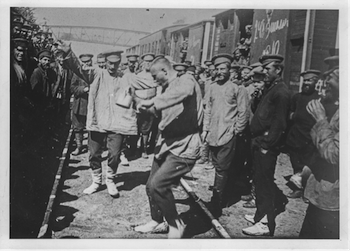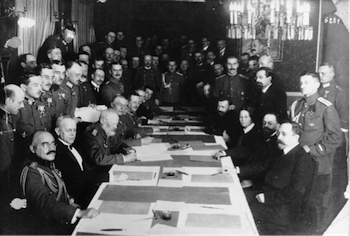

|
Revolutionary War or Peace?  The self-demobilization of the Russian army Of all the Bolshevik decrees passed in their first days of power none had the same emotional appeal as the Decree on Peace - a bombastic 'Proclamation to the Peoples of All the Belligerent Nations' proposing a 'just and democratic peace'. The Decree on Peace was an expression of hope, not a statement of fact. The Bolsheviks used it as propaganda to fan the flames of revolution in the West. The belief in the imminence of a world revolution was central to Bolshevik thinking. As Marxists, it was inconceivable to them that the socialist revolution could survive for long in a backward peasant country like Russia without the support of the proletariat in the advanced industrial societies. But what would happen if this world revolution failed to come about? The Bolsheviks would be without an army (for millions of soldiers took the Decree on Peace as an excuse to demobilize themselves) and would be defenceless against a German invasion. To those on the left of the party, such as Bukharin, a separate peace with imperialist Germany would represent a betrayal of the international cause. They favoured a revolutionary war against the German invaders, thinking that it would inspire revolutions in the West. Lenin, by contrast, was increasingly doubtful about the chances of fighting such a war. Without an army, the Bolsheviks had no choice but to conclude a separate peace, which would give them the 'breathing spell' they needed to consolidate their power base. On 16 November a Soviet delegation left for the Belorussian town of Brest-Litovsk to sign an armistice with the Germans. In mid-December Trotsky was sent to drag out the peace-talks for as long as possible in the hope of stirring revolution in the West. The Germans' patience soon ran out. They opened talks with the Ukrainians, who were ready to accept a German protectorate to win their independence from Bolshevik Russia, and used this threat to pressure the Russians to accept their tough demands for peace, including the separation of Poland from Russia and the German annexation of Lithuania and most of Latvia. Trotsky called for an adjournment and returned to Petrograd to confer with the rest of the Bolshevik leaders.  The talks at Brest Litovsk At the decisive meeting of the Central Committee on 11 January the largest faction supported Bukharin's call for a revolutionary war. Trotsky, with the second biggest, suggested playing for more time. But Lenin insisted that they had no choice but to sign a separate peace, in which case it was better done sooner than later. There was no point putting the whole of the revolution at risk on the chance that a German revolution might break out. 'Germany is only just pregnant with a revolution, but we have already given birth to a completely healthy child.' Lenin was forced to ally with Trotsky, who was sent back to Brest-Litovsk to spin out the talks. But on 9 February the Gemans signed a treaty with the Ukrainians, and on the 18th they recommenced hostilities against Russia. Within five days the Germans had advanced 150 miles towards Petrograd - as much as the German army had advanced in the three previous years. Lenin was furious. By refusing to sign the German treaty, his opponents in the Central Committee had merely enabled the enemy to advance. After heated debate he at last got his way in the Central Committee and a cable was sent to Berlin accepting the German conditions. But for several days the German troops continued to advance towards the Soviet capital. Lenin reversed his earlier position and called for a revolutionary war. The Bolsheviks evacuate the capital to Moscow. On 23 February the Germans delivered their final terms for peace. Berlin now demanded all the territory which its troops had seized. The Treaty of Brest-Litovsk was finally signed on 3 March. By its terms, Soviet Russia was forced to give up most of its territories on the continent of Europe. Poland, Finland, Estonia and Lithuania were all given nominal independence under German protection. Soviet troops were evacuated from Ukraine. All in all, the Soviet Republic lost 34 per cent of her population, 32 per cent of her agricultural land, 54 per cent of her industrial enterprises and 89 per cent of her coalmines. |
© 2014 Orlando Figes | All Rights Reserved